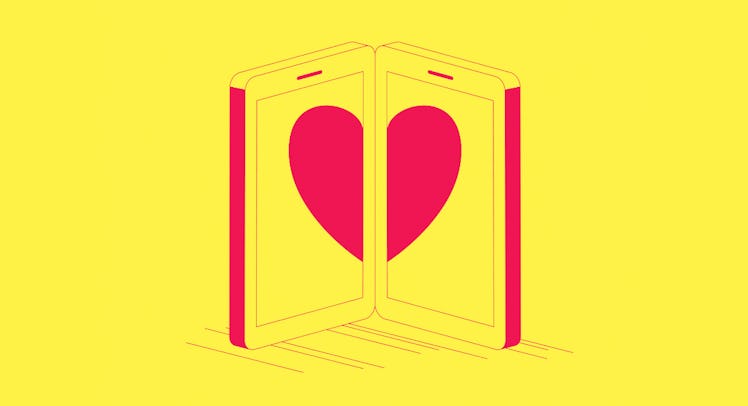Quantified Love Will Save Marriages, One Awkward Conversation At A Time
What happens when you fail a love test?

Counting steps has become an essential quantification that allows people to understand their lives and set more aggressive health goals. Now, the advent of new technologies is going to allow us to do the same with love. Yes, that human experience that is meant to be transcendent can now be treated like a daily step count. Unromantic? Maybe. But even relationships require reflection and goals.
“Because of all the advances in wearable technology and the internet of things, this is now doable, more than ever,” says Theodora Chaspari of the University of Southern California’s Couple Mobile Sensing Project.
Chaspari, who studies bio-signals, is part of a cross-disciplinary team of engineers and psychologists working on the USC project, which aims to create an application leveraging wearable and mobile device technology to capture biological data on what happens when couples interact. Originally developed for psychological researchers to collecting hard biological evidence, the Mobile Sensing team currently uses a small suite of wireless devices to monitor study participants.
Currently, four devices work in concert, a phone, a smart watch and two heart and respiration monitoring devices, although the hope is to combine them into a single device, a phone or smartwatch. They monitor heart activity, stress response and voice intonation and content. And upon clearing a few technical hurdles, Couple’s Mobile Sensing could be coming to app stores everywhere. Eventually.
“Our hope is to be able to get this application out in the world,” says Chaspari. “At some point.”
Chaspari explains that the amalgam of data collected by sensing devices could be hugely beneficial for couples if centralized and parsed effectively. She imagines a device that warns a partner that their significant other is stressed out before they get home. Her notion isn’t to remove romance or serendipity, but unpleasant surprises. And that might actually build anticipation in a positive way. Chaspari explains that it’s theoretically possible to build an application that acts as a relationship diary, tracking things like positive discussions and language. The device could graph a healthy relationship and make maintaining one feel like an achievable goal while pushing couples to have the difficult conversations that often lead to real closeness.
The practical benefits of this sort of technology are myriad for a simple reason: Adults are largely awful at monitoring their own emotional well-being or understanding their partners. According to “love biologist” Dawn Maslar, who is unassociated with the USC project, emotional intelligence is a very rare thing. When it comes to relationships, people tend to be more emotional than intelligent,
“When you’re under stress… the primitive brain hijacks the intelligent brain and that’s why people make all these emotional decisions,” she says. “A lot of times, when your own brain kicks in, you’ll default to fear based ideas. More data is always better.”
Maslar has developed her own method for collecting data. She calls it the Devotion Test. She came upon the idea while writing her book Men Chase, Women Choose. During her research, she discovered that there are hormonal and neurological changes detectable in a man’s saliva when he is in love. That’s when she decided to develop a lateral flow assay test, like a pregnancy test, to detect those biological markers of devotion. The test is currently being funded on Indiegogo, but Maslar plans to release an instant read device that allows a guy to prove to his partner that his body is showing signs of love.
Maslar intends for the Devotion Test to be another avenue for quantifiable insight, particularly for women who are using their emotions to dictate their decisions. However, she says the test would be a useful tool for husbands accused of apathy or creating emotional distance. Maslar is quick to acknowledge the potential pitfalls of that use case. It’s not difficult to imagine a test being used to bully a partner or misinterpreted as a negative diagnosis for love. Essentially turning the data into a form of abuse.
“In my case, I can see some women who are using the test because they know their partner is not committed,” says Maslar. “She probably already knew anyway, she just wanted it for confirmation.”
For Chaspari, biological data connected to relationships are no more or less likely to be abused than any of the digital tools couples already have at their disposal. “We’re trying to operate with the idea that people will have good intentions to improve their relationship,” she says. “But it’s kind of like Facebook, right? Not everyone uses it for good, but it’s still there.”
And if things get rough, Chaspari points to the fact that couples therapists will find that data incredibly useful in understanding what’s really happening in a relationship, rather than relying on He-said, She-said.
For now, a couples therapist will have to rely on their old ways. That’s fine, considering they’re probably the best shot a troubled couple has at keeping things together. At least until the relationship Fitbit is released, or the Devotion Test hits Amazon.
This article was originally published on